Boron nitride is a promising path to practical graphene devices
Berkeley Lab and UC Berkeley researchers analyze a superior substrate for graphene.
May 28th, 2011
Read more
Berkeley Lab and UC Berkeley researchers analyze a superior substrate for graphene.
May 28th, 2011
Read moreIn new commentary in Science, University at Buffalo physicists discuss advancements in controlling the behavior of magnetic materials.
May 27th, 2011
Read more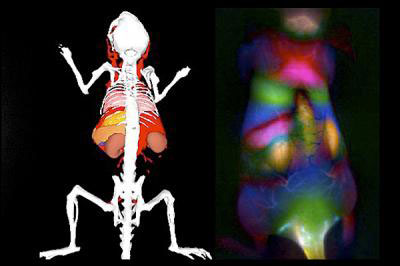 Stanford researchers have developed an improved imaging method using fluorescent carbon nanotubes that allows them to see centimeters deep into a mouse with far more clarity than conventional dyes provide. For a creature the size of a mouse, a few centimeters makes a great difference.
Stanford researchers have developed an improved imaging method using fluorescent carbon nanotubes that allows them to see centimeters deep into a mouse with far more clarity than conventional dyes provide. For a creature the size of a mouse, a few centimeters makes a great difference.
May 27th, 2011
Read more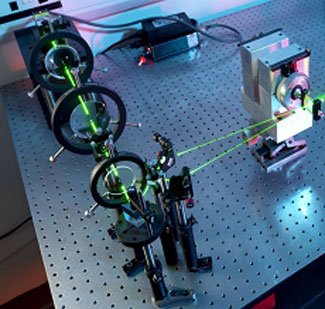 The National Physical Laboratory (NPL) in the UK is developing three optical techniques that use light scattering to make these measurements in solid polymers: frequency-domain optical coherence tomography (FD-OCT), Fraunhofer wavefront correlation (FWC) and oscillatory photon correlation spectroscopy (Os-PCS).
The National Physical Laboratory (NPL) in the UK is developing three optical techniques that use light scattering to make these measurements in solid polymers: frequency-domain optical coherence tomography (FD-OCT), Fraunhofer wavefront correlation (FWC) and oscillatory photon correlation spectroscopy (Os-PCS).
May 27th, 2011
Read moreIn einem neuen Sonderforschungsbereich wollen Naturwissenschaftler und Ingenieure der RWTH Nanoschalter entwickeln, die aehnlich wie Nervenzellen arbeiten.
May 27th, 2011
Read more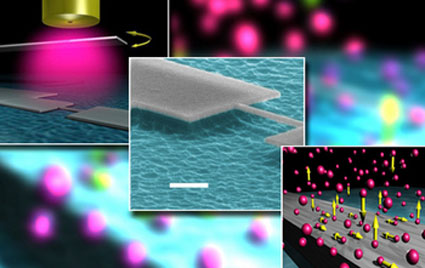 At the forefront of nanotechnology, researchers design miniature machines to do big jobs, from treating diseases to harnessing sunlight for energy. But as they push the limits of this technology, devices are becoming so small and sensitive that the behavior of individual atoms starts to get in the way. Now Caltech researchers have, for the first time, measured and characterized these atomic fluctuations - which cause statistical noise - in a nanoscale device.
At the forefront of nanotechnology, researchers design miniature machines to do big jobs, from treating diseases to harnessing sunlight for energy. But as they push the limits of this technology, devices are becoming so small and sensitive that the behavior of individual atoms starts to get in the way. Now Caltech researchers have, for the first time, measured and characterized these atomic fluctuations - which cause statistical noise - in a nanoscale device.
May 27th, 2011
Read moreNanotechnology is opening up new markets and offering novel solutions to numerous challenges in a very varied range of areas. This was the tenor of the 1st Swiss NanoConvention which took place on May 18 and 19 in Baden.
May 27th, 2011
Read more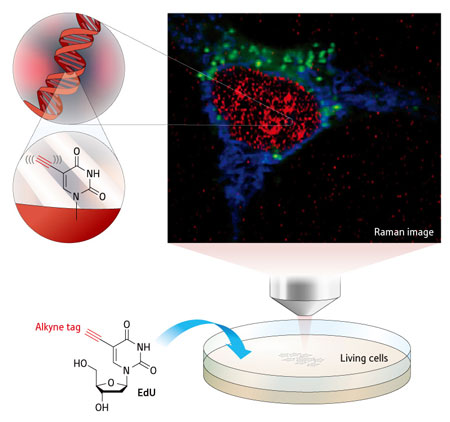 Revealing the inner workings of cells takes a step forward using a newly developed Raman microscopy technique.
Revealing the inner workings of cells takes a step forward using a newly developed Raman microscopy technique.
May 27th, 2011
Read more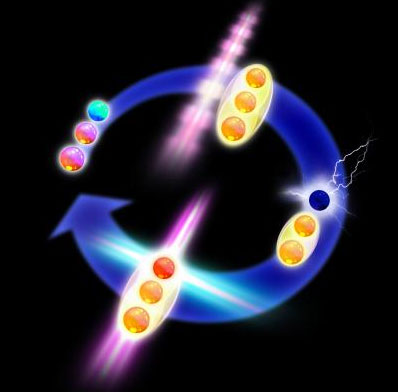 A general rule in data processing is that disturbances cause the distortion or deletion of information during data storage or transfer. Methods for conventional computers were developed that automatically identify and correct errors: Data are processed several times and if errors occur, the most likely correct option is chosen. As quantum systems are even more sensitive to environmental disturbances than classical systems, a quantum computer requires a highly efficient algorithm for error correction.
A general rule in data processing is that disturbances cause the distortion or deletion of information during data storage or transfer. Methods for conventional computers were developed that automatically identify and correct errors: Data are processed several times and if errors occur, the most likely correct option is chosen. As quantum systems are even more sensitive to environmental disturbances than classical systems, a quantum computer requires a highly efficient algorithm for error correction.
May 27th, 2011
Read moreMedicine and technology are converging in patient care at a faster pace than most people realize. Space age advancements from point-of-care health technologies like telemedicine to medical robots performing surgery are fast becoming commonplace in many hospitals. What's next?
May 26th, 2011
Read moreA newly released OECD document provides a snapshot of information on current/planned activities related to the safety of manufactured nanomaterials in OECD member countries and other delegations that attended the 8th meeting of OECD's Working Party on Manufactured Nanomaterials (Paris France, 16-18 March 2011).
May 26th, 2011
Read more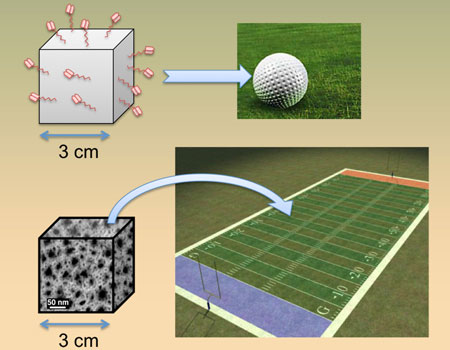 Vanderbilt University engineers have created a "spongy" silicon biosensor that shows promise not only for medical diagnostics, but also for the detection of dangerous toxins and other tiny molecules in the environment. This innovation was originally designed to detect the presence of particular DNA sequences, which can be extremely helpful in identifying whether or not a person is predisposed to heart disease or certain kinds of cancer.
Vanderbilt University engineers have created a "spongy" silicon biosensor that shows promise not only for medical diagnostics, but also for the detection of dangerous toxins and other tiny molecules in the environment. This innovation was originally designed to detect the presence of particular DNA sequences, which can be extremely helpful in identifying whether or not a person is predisposed to heart disease or certain kinds of cancer.
May 26th, 2011
Read moreThe University of Virginia, in partnership with the College of William and Mary and Old Dominion University, has launched the Virginia Nanoelectronics Center, or ViNC, to advance research aimed at developing next-generation electronics.
May 26th, 2011
Read more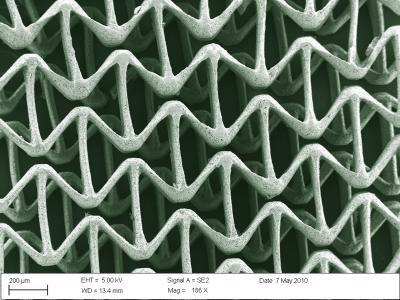 A new biomaterial designed for repairing damaged human tissue doesn't wrinkle up when it is stretched. The invention from nanoengineers at the University of California, San Diego marks a significant breakthrough in tissue engineering because it more closely mimics the properties of native human tissue.
A new biomaterial designed for repairing damaged human tissue doesn't wrinkle up when it is stretched. The invention from nanoengineers at the University of California, San Diego marks a significant breakthrough in tissue engineering because it more closely mimics the properties of native human tissue.
May 26th, 2011
Read moreResearchers are testing different ways of improving rechargeable batteries for electric vehicles and nanotechnology plays an important role in the development. The aim is to offer batteries that have fast charge and discharge rates as well as high stored energy per mass. This can make electric vehicles a competitive alternative to petrol-powered vehicles.
May 26th, 2011
Read moreThe TAPPI International Conference on Nanotechnology for Renewable Materials, June 6 - 8, 2011 in Arlington, VA, USA gives scientists the unique forum for focusing on the key issues and technologies that will sustain U. S. manufacturing in the coming decades.
May 26th, 2011
Read more